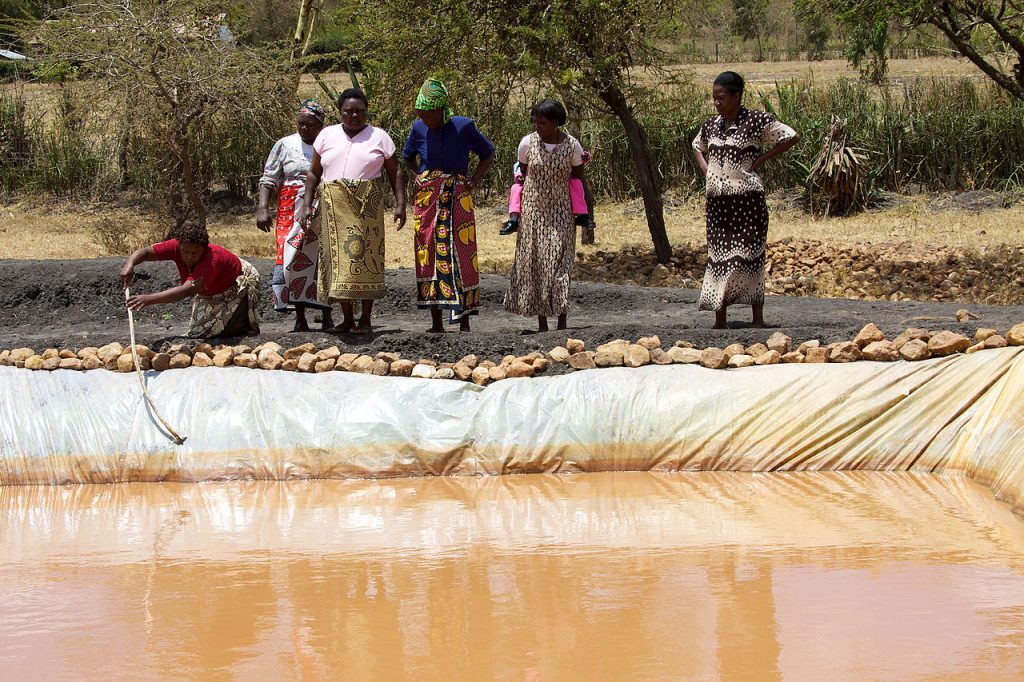 A 22-member women's agriculture group in Machakos, Kenya runs a fish pond enterprise. As well as the pond, their members do bee keeping (17 hives), rear goats and chickens, and grow fruits and vegetables in their own personal kitchen gardens.
Wikimedia Commons/McKay Savage
A 22-member women's agriculture group in Machakos, Kenya runs a fish pond enterprise. As well as the pond, their members do bee keeping (17 hives), rear goats and chickens, and grow fruits and vegetables in their own personal kitchen gardens.
Wikimedia Commons/McKay Savage Building on how the communications revolution could transform the lives of hundreds of millions of farmers in developing countries is one of the great opportunities of our times.
Micheal Haillu, Director CTA, 2014
Information and communication technologies (ICTs) play a vital role in the dissemination of information to farmers. ICT tools are also essential for harnessing and capturing local farmer knowledge. Innovative use of ICT tools recognizes the importance of two-way communication, and ICT can be used more efficiently to achieve the goals of agricultural extension. Beyond connectivity ICT offers security and mobility to owners, and requires that users have basic literacy. In addition to voice communication ICT tools allow for transfer of data, which can be used in context for applications and in agriculture. In Kenya, a study conducted to understand the actual use of mobile services, products, and applications at the Base of the Pyramid (BoP), or the poorest segment of the population living on less than U.5.$2.50 per day, found out that over 60% of the respondents among the Kenyan BoP own a mobile phone, but very few used the applications other than for M-PESA payment services.
What Needs to be Done to Ensure that ICTs Fulfill Their Potential?
Different empirical studies have shown that knowledge cannot easily reach farmers through traditional extension systems and development projects. In response, new ways of managing knowledge have emerged across developing countries beyond the traditional farmer-extension systems. The challenge of the use of ICTs for small holder agriculture in Africa is no longer hampered by access or ownership to basic ICT tools, such as the mobile phone, at the household level the way it was ten years ago.
New ways of managing knowledge have emerged across developing countries beyond the traditional farmer-extension systems.
The challenge is in the social processes used to transmit, and in tracking the knowledge pathways within social networks. Knowledge and social processes are part of knowledge systems in societies. Knowledge initially exists in the mind of an individual and is transmitted through social groups, networks, and practice. To enable replication of practices and spread of knowledge, pathways that facilitate the flow of information are created and supported through transmission channels. In Africa, community meetings, evening drinking joints, and water collection points, especially for women, are very good sources of knowledge and information.
The advantage of using ICT tools in agricultural extension therefore becomes more important as they support conventional agricultural knowledge pathways that share the same characteristics as traditional oral cultures of knowledge transmission in African social systems. For example, a farmer will adopt an innovation when he sees how successful a fellow farmer has been in adapting the innovation. In such traditional culture systems, interpersonal communication is considered more trustworthy.
What Therefore are the Social Implications?
For any innovation to have a developmental impact, social mobilization of communities has to take place through the traditional community channels of transmission of information. In traditional African societies, there are the community gate keepers, who normally consist of the elders, elected leaders, and opinion and religious leaders. For any innovation to take root, it has to pass through these traditional social channels. Indeed several keynote speakers during ISTAS 2015 [6] highlighted the relationship between technology, development, and the role of innovation in this process. Of note was that unless technological developments were transferred to users, and unless the importance of social mobilizations of communities was emphasized, the technologies that were being developed would have minimal impact. The President of Ireland, speaking at the opening event further emphasized that innovation and development should be delivered within the context of social justice. Scientific research and technological development was increasingly playing an important role in our societies. Within that context, Ireland was increasing support for research and extension especially for poor farmers and specifically women farmers. And this was in line with the Sustainable Development goals [7].
Therefore much as the primary goal of acquiring a radio, phone, or television set at the household level is normally for communication, entertainment, and keeping abreast of current events, the roles of these tools have a much wider social and economic implications in moving forward innovations and agricultural development. ICT tools are increasingly being conceptualized as social rather than economic tools, their application in the development process involves both people led processes as well as networks.
Author
Janet Achora works in the ICT4 Development and Agriculture extension field, and is a Ph.D. candidate in Agricultural and Rural Innovations at Makerere University-Uganda. Email: janet.achora@act-africa.org/jalonyo@gmail.com.







 JOIN SSIT
JOIN SSIT